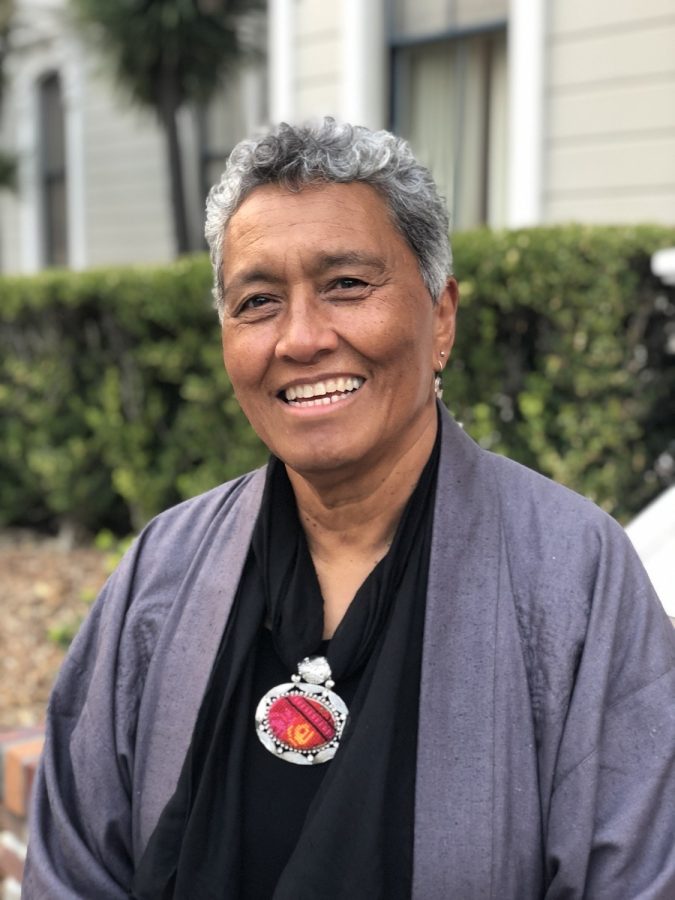Brown Commons Hosts Margo Okazawa-Rey in “Seekers, Believers, and Doubters” Lecture
“There are seekers, there are believers, and there are doubters,” said Coleman Brown, “and it is important to speak to all three types of people.” The Brown Commons “Seekers, Believers, Doubters” series is dedicated to the namesake of the commons – Coleman and Irene Brown – and this year’s event featured Margo Okazawa-Rey, a professor, writer and social activist who came to campus to speak about her inspiration, author Lorraine Hansberry.
Hansberry was a playwright and writer who authored “Raisin in the Sun,” the first play produced by a Black woman on Broadway. Okazawa-Rey spoke about how Hansberry was described as more radical than Malcolm X, and suggested the documentary, “Lorraine Hansberry Sighted Eyes/ Feeling Heart” as a valuable resource for learning more about her life. Hansberry looked at the world through a lens of intersectionality and had a vision that all people in the world could be free.
Using Hansberry’s framework, Okazawa-Rey discussed our worldwide COVID-19 syndemic, the resurgence of right-wing political movements, the closing of democratic spaces and feminist resistance.
Okazawa-Rey went on to share her favorite quote by Hansberry with the audience, as a starting point for her discussion on what it means to be human in this moment — amid a pandemic that has left some feeling surrounded by death and loss. She described how we are in a syndemic, as we are plagued both by COVID-19 and by other sociopolitical issues.
“I wish to live because life has within it that which is good, that which is beautiful, and that which is love. Therefore, since I have known all of these things, I have found them to be reason enough and — I wish to live. Moreover, because this is so, I wish others to live for generations and generations and generations and generations,” Okazawa-Rey shared, quoting Hansberry’s work.
Brown Commons residential fellow Shavell Jones helped to organize the event and invited Okazawa-Rey to Colgate.
“Professor Margo Okazawa-Rey was one of my professors and mentors at Hamilton College (where I graduated last year). When initially asked for suggestions for speakers for the Believers, Seekers, and Doubters event, Margo was the first person who came to my mind,” Jones said. “Margo’s longstanding commitment to activism in both her scholarship and service made her the perfect person to speak at the Believers, Seekers, and Doubters series.”
In order to make the event more discussion-based, Okazawa-Rey had the audience break out into small groups. A wide variety of discussions took place, and attendees had the opportunity to share how loss has affected them in the current moment as well as the feelings of isolation that they have experienced.
Shavell was happy with how the event played out, particularly highlighting how group discussion became the central focus of Okazawa-Rey’s visit.
“It ended up feeling like a conversation more so than a lecture. Many students appreciated sharing their opinions and having conversations around them,” he said.
First-year Rian Magner also appreciated how Okazawa-Rey encouraged the audience to take up a new perspective on our surroundings.
“The speech that was given by Professor Margo Okazawa-Rey provided a different perspective surrounding the culture of the pandemic and made me reflect on how we influence the world around us during times like these,” Magner said.
Okazawa-Rey described a feeling that most event attendees seemed to relate to –‘having feelings of hope in bleak moments can be seen as radical or immature. But in the current political climate, when the whole world seems to be shifting right, we must grow our imaginations and work to imagine new possibilities.’
The discussion then shifted to another one of Okazawa-Rey’s inspirations, Gracie Lee Boggs. Boggs was a Chinese American from Detroit who was a “die-hard Marxist.” But, at the end of her life, she began to be more philosophical. Okazawa-Rey discussed how Boggs’ main goal was to encourage people to improve their souls, and to focus on the kind of people they want to become in order to avoid recreating the world that they have already worked to change.
Okazawa-Rey was intrigued by these questions: “What types of human beings must we become so we don’t recreate the same mess we are trying to change? How does personal development come together with social progress so that both things can happen?”







